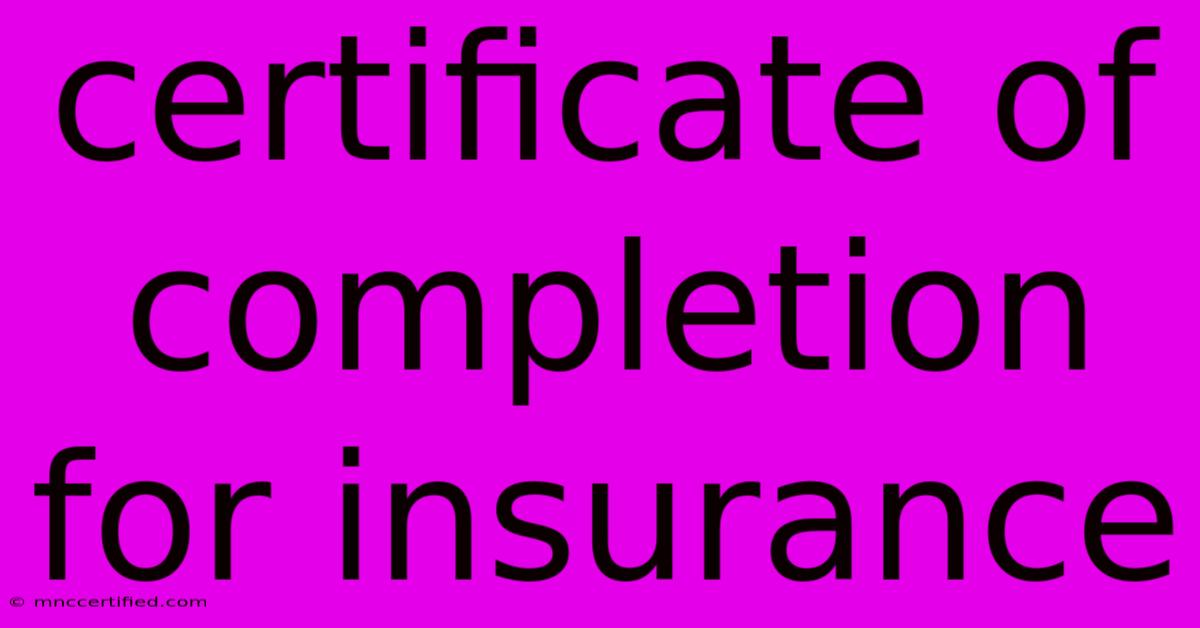Certificate Of Completion For Insurance

Table of Contents
The Importance of a Certificate of Completion for Insurance: A Guide for Professionals
In the competitive world of insurance, demonstrating your expertise is crucial for attracting clients and solidifying your position as a trusted professional. One key way to achieve this is through obtaining a certificate of completion for relevant insurance courses and programs.
This guide delves into the significance of a certificate of completion for insurance professionals, exploring its benefits and offering tips for securing one.
What is a Certificate of Completion for Insurance?
A certificate of completion serves as official documentation confirming your successful participation and completion of an insurance course or program. It typically includes your name, the course title, the date of completion, and the issuing organization's details.
Why is a Certificate of Completion Important for Insurance Professionals?
Holding a certificate of completion for insurance offers several advantages:
1. Enhanced Expertise and Credibility: By demonstrating your commitment to continuous learning and staying updated with industry trends, a certificate elevates your professional image and inspires trust in clients.
2. Competitive Advantage: In a crowded market, having the right certifications can set you apart from the competition and attract clients who value specialized knowledge and skills.
3. Career Advancement Opportunities: Many insurance companies prioritize candidates with relevant certifications for promotions, salary increases, and leadership roles.
4. Compliance with Licensing Requirements: Depending on your location and insurance specialization, certain certifications may be mandatory for licensing or regulatory compliance.
5. Professional Networking Opportunities: Attending courses and workshops often lead to networking with peers and industry experts, expanding your professional circle and opening new avenues for collaboration.
How to Obtain a Certificate of Completion for Insurance
-
Identify Relevant Courses: Research and choose courses or programs aligned with your career goals and insurance specialization. Consider online learning platforms, industry associations, and reputable educational institutions.
-
Enroll in a Program: Select a program that meets your learning style, time constraints, and budget.
-
Complete the Course Requirements: Actively participate in the program, complete assignments, and attend all sessions to ensure a successful outcome.
-
Receive and Display Your Certificate: Once you've completed the program, you'll receive your certificate of completion. Display it prominently in your office or website to showcase your expertise.
Tips for Maximizing the Benefits of a Certificate of Completion:
- Choose reputable organizations: Opt for programs offered by well-known and respected institutions in the insurance field.
- Tailor your certifications: Select courses that directly relate to your area of expertise and current market demands.
- Actively engage in learning: Go beyond simply completing the course requirements. Actively participate in discussions, ask questions, and apply your new knowledge.
- Update your credentials: Keep your certifications current by pursuing continuing education units (CEUs) or attending refresher courses.
Conclusion
Obtaining a certificate of completion for insurance demonstrates your commitment to professional development and enhances your credibility in the eyes of clients and employers. By investing in your education, you gain a significant edge in a competitive industry, paving the way for career advancement and a thriving practice. Remember, continuous learning is key to staying ahead in the dynamic world of insurance.

Thank you for visiting our website wich cover about Certificate Of Completion For Insurance. We hope the information provided has been useful to you. Feel free to contact us if you have any questions or need further assistance. See you next time and dont miss to bookmark.
Featured Posts
-
Tree Surgeon Public Liability Insurance
Nov 08, 2024
-
Best Health Insurance For Speech Therapy
Nov 08, 2024
-
Craig I Dont Know Next James Bond
Nov 08, 2024
-
New York Life Insurance Company Tampa Fl
Nov 08, 2024
-
Porn Addiction North Korean Soldiers After Access
Nov 08, 2024